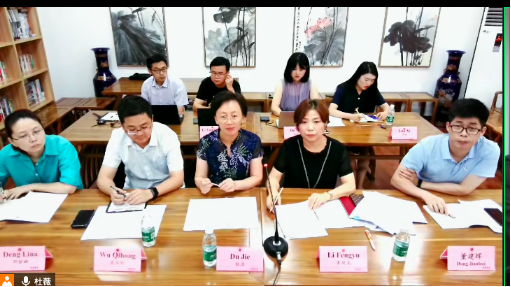On the afternoon of July 20, Chengdu University (CDU) held a regular meeting on the project operation with the Head of the Foreign Cooperation Office, the Director of the College of Construction and professors in the major of Yeungnam University (YU) in South Korea to sort out and summarize the problems arising during the project operation in the semester, after a seminar on CDU-YU Joint Program in Engineering Cost with YU's Foreign Cooperation Office on June 2. Du Jie, Director of the Office of International Cooperation and Exchange and Dean of the Overseas Education College, and Wu Qihong, Dean of the School of Architecture and Civil Engineering of CDU, andYeo Taek Dong, Director of the Office of the International Cooperation andKwon Jong Wook, Director of the School of Architecture of YU, led each party's relevant persons on the project to participate in the meeting.

Du Jie started with a summary of the cooperation achievements made by CDU and YU. Noting that the two universities have carried out the cooperative education project for nearly six years, she pointed out that multiple problems have arisen, but the project has achieved meaningful results. There has been a remarkable improvement in the quality of students and students' employment and further education, and the two parties have jointly completed the application for extending the project for another five years this year. Besides, Du Jie thanked YU for its years of hard work and dedication in the operation and teaching work of the cooperative education project and said that this year's successful application for project extension wouldn't have been completed without YU's practicable coordination and will lay a solid foundation for mutual in-depth cooperation in the future.
Wu Qihong summarized the situation on teaching model, major construction and other aspects since the project commenced from the perspective of teaching. Mentioning that the courses by YU's teachers are conducted mainly online since the outbreak of COVID-19, he hoped that the two universities will carry out closer cooperation in the future to explore more effective teaching models against the backdrop of COVID-19 to help students participating in the project graduate successfully.

Then the participants had specific exchanges on aspects such as improving students' language ability during the project operation, teaching models during and after the epidemic, meeting mechanism for project operation and credit certification.Through the exchanges, the two parties reached multiple consensuses, made clear the next work plan, expressed willingness to expand the cooperation platform with positive and practicable efforts and anticipated mutual in-depth exchanges and cooperation in faculty exchange, academic research and other aspects in the future.